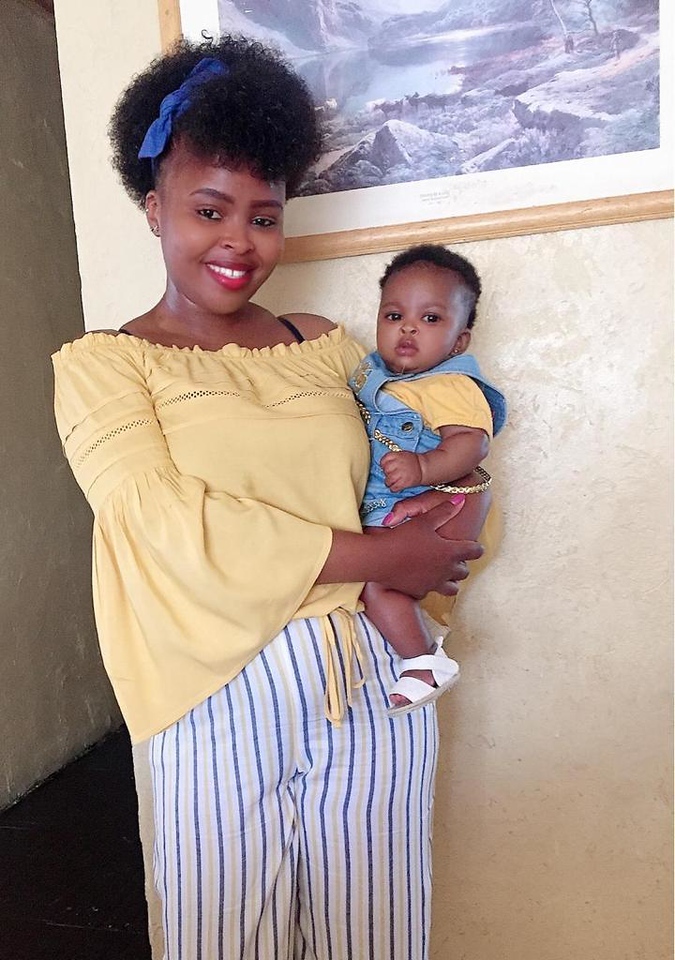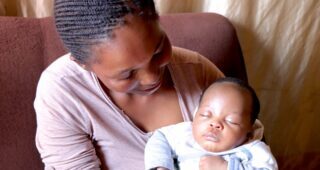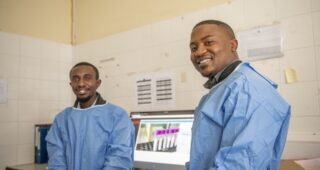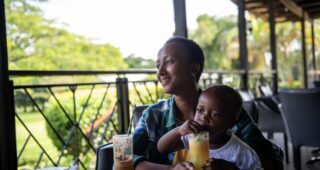“HIV Did Not Stop My Dream of Motherhood”

Four years ago, at the age of 19, Matsepo ‘Dee’ Mphafi Tanka learned that she is living with HIV. A young woman just starting her adult life, Dee wondered if she would ever achieve one of her dreams—to be the mother of a healthy baby. Through education and fellowship with other young people living with HIV, Dee overcame fear and stigma. She has married and now prepares for her first Mother’s Day with her healthy daughter, Ntaoleng Tlotlisang Tanka.
Dee was born on the outskirts of Maseru, Lesotho, a mountainous nation surrounded by South Africa. Lesotho has the second highest global prevalence of HIV, so as an adolescent, Dee was acutely aware of HIV as it affected people around her. She tested regularly for HIV, always with negative results—until 2016 when she was shocked that the result came back as positive.
After diagnosis, Dee was lonely and afraid, but in 2017, she accessed HIV and health services at Queen Elizabeth II Adolescents and Youth Friendly Health Services (AYFHS), commonly known as the Adolescent Corner. She then joined a peer support group at the same facility, sponsored by the Elizabeth Glaser Pediatric AIDS Foundation (EGPAF). She flourished within the group and within a year was volunteering as a peer educator, encouraging other adolescents and young people to know their HIV status and supporting them through their journey with HIV. In 2019 she was elevated to Senior Youth Ambassador and now mentors new peer educators to support adolescents and young people with HIV.
Throughout, Dee held onto her dream that one day she would have children of her own.
“HIV could not stop my dream. I always wanted to be a mother, but I knew I’d have to stay healthy and adhere to my treatment to not transmit the virus to my loved ones, especially my baby.” Dee Mphafi Tanka
“HIV could not stop my dream—it can be managed like any other medical condition,” says Dee. “I always wanted to be a mother, but I knew I’d have to stay healthy and adhere to my treatment and ensure my viral load is undetectable to not transmit the virus to my loved ones, especially my unborn baby.
“The goal is to achieve an AIDS-free generation,” says Dee.
In 2020, Dee’s dream come to life when she became pregnant. She went for blood test and was elated to find that her work in adhering to her medication had paid off: her viral load was undetectable, which mean the chances of her baby being born HIV-negative were high.
In August of 2020, Dee welcomed her healthy child to the world. With an undetectable viral load, Dee was able to exclusively breastfeed her daughter, giving her baby the nutrients and antibodies she needed to thrive. At six weeks, the baby tested for HIV through the early infant diagnosis program, and was found negative.
“I was nervous, but when I was told that the baby is free from HIV … what a relief!” says Dee.
The baby is eight months old now and will test again at nine months. We caught up with Dee recently and asked her how motherhood has changed her.
Being a mother is different to every woman. What does motherhood mean to you?
It all started during pregnancy when the motherly instinct is activated and one is always holding the baby bump to feel every movement; it means loving a soul before you even see it. It’s carrying and caring for a life that depends completely on me for survival. It’s being selfless and putting someone before yourself—loving your baby unconditionally.
It’s sleepless nights; it’s nursing scratches and scrapes. It’s being stern and protective. It’s teaching another person to talk, to walk, and to eventually run. It’s seeing her cry and not knowing how to fix it, so you sit on the floor and hold her and cry right along beside them. It’s teaching her that she is smart, capable, funny—and giving her the security to do great things.
It’s a gift, a blessing, a relationship that never ends and a love that never dies.
How is motherly love different from other love?
The mother-baby bond is an unmatched connection. It’s a love that grows continually, a love that always wants more and better for your child.
Motherly love is being strong for your child when you are weak. It’s smiling when you want to cry and crying when you are smiling. It’s looking through the pictures and feeling your heart swell with love and happiness when you see the beauty, the happiness, and the life in your child’s smile and eyes.
It’s being woken up early on Saturday morning because my daughter wants to crawl in bed and be close to my heart.
It’s having the worst day of deadlines and having her kiss me all over the face and not want to leave me.
What has been the most challenging time of your motherhood?
Motherhood, for me, is a season of self-sacrifice, self-reliance, sleeplessness, and change. It’s both the best job and also one of the hardest. Raising a child is intense and all-consuming. Sometimes I just feel like I’m doing everything wrong, and the baby is just crying—and I don’t know the reason why she is crying. But my worst fear is that it’s all an unknown territory—you just don’t know what will happen tomorrow, or an hour from now, or what kind of person she’ll turn out to be.

Mothering is hectic It’s no secret that working mothers can often be short on time, stressed out, and feel like they’re pulled in million different directions. Even though I’ve been working from home, the feeling is still the same and even worse because the baby feels like I ignore her because I’ll be busy on my computer.
But I have the most amazing husband to help me feed her and bathe her while I do my work. I promise myself to recover all the time I lost with her while I’m working.
I remember when I had a training in Mohale’shoek for which I had to leave her for three days. She’d wake up when I was gone and not see me for the rest of the day. But I made sure that I was with her to recover all the time and gain her trust back.
Being a mom doesn’t come with a playbook. No matter how many or how few preparations you make, you can still be thrown a curve ball come delivery day. But I’ve heard so many extraordinary tales of strength; perseverance; loss; and, most importantly, love that teach us that every journey is different—and that’s okay. And I just put everything to God that he should take control and strengthen me through this journey.
Lesotho
General; Maternal & Child Health; Prevention of Mother-to-Child Transmission



